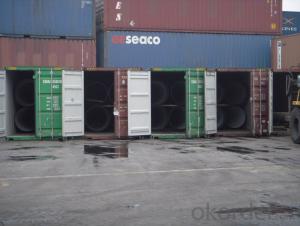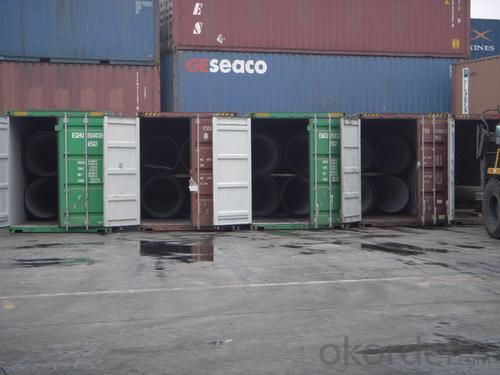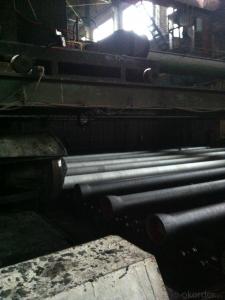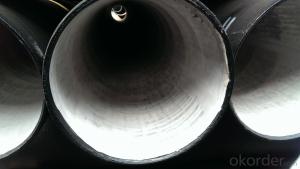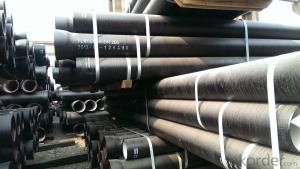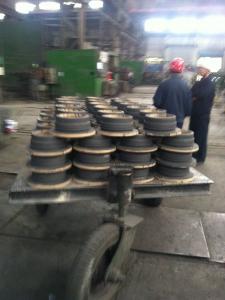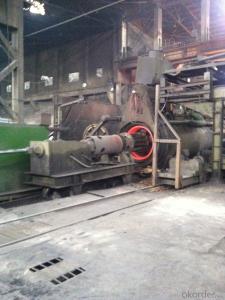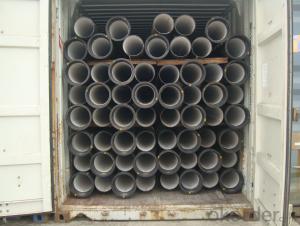DUCTILE IRON PIPES AND PIPE FITTINGS DN450
- Loading Port:
- Tianjin
- Payment Terms:
- TT OR LC
- Min Order Qty:
- 25 m.t
- Supply Capability:
- 30000 m.t/month
OKorder Service Pledge
OKorder Financial Service
You Might Also Like
Material : Ductile Cast Iron
Size Range : DN 80mm to DN 2000mm
Unit Effective Length : 6m or 5.7m
Manufacture Standard: ISO 2531:1998/ EN 545:2006/EN 598:2007
Annual capacity : 200,000 tons
Coating Exterior: Zinc 130g/m2 according to ISO 8179-1 and bitumen coating 70 microns.
Cement Interior: Portland Cement/ High Alumina Cement/ Sulphate Resisting Cement Lining according to ISO 4179
Special requirements on external coating and internal lining can be applied
We also provide accessories such as SBR/EPDM rubber gaskets, lubricant paste, pipe caps, PE sleeves, etc.
Additional Parts:
Each pipe is strictly inspected according to related standard to ensure permanently high performance.
Easy Installation at site and service free for life
Long Service Lifespan
Quotation will arrive you within 24hours once we get your inquiry.
We guarantee offering you a competitive price.
A copy of original inspection reports of pipes will be offered after shipment.
Photos of loading process will be sent to the customer after shipment effect.
We will follow-up the delivery progress after shipment effect and update to the customer on weekly basis.
- Q: What are the different pressure classes available for ductile iron pipe?
- The different pressure classes available for ductile iron pipe include Class 100, Class 150, Class 200, Class 250, Class 300, Class 350, and Class 400.
- Q: Can ductile iron pipes be used in high-temperature applications?
- Ductile iron pipes are capable of being utilized in applications that involve high temperatures. Unlike PVC or HDPE pipes, ductile iron pipes possess a higher melting point, rendering them suitable for transporting fluids at elevated temperatures. The material properties of ductile iron, encompassing its strength, toughness, and ability to withstand thermal stress, allow it to endure higher temperatures without distorting or failing. Nevertheless, it is worth noting that the precise temperature threshold for ductile iron pipes may vary depending on factors such as the grade of ductile iron employed, the pressure of the fluid being conveyed, and the duration of exposure to elevated temperatures. Consequently, it is imperative to consult the manufacturer's specifications and guidelines in order to ensure the appropriate selection and installation of ductile iron pipes for high-temperature applications.
- Q: Are ductile iron pipes resistant to external loads?
- Generally, external loads pose little challenge to ductile iron pipes. Ductile iron, a variant of cast iron, undergoes treatment with magnesium and cerium additives to enhance its flexibility and durability. As a result, these pipes possess the ability to endure substantial external pressure and stress without succumbing to cracks or fractures. Ductile iron pipes find extensive implementation in scenarios where heavy loads are anticipated, including underground water distribution systems, sewer lines, and industrial pipelines. Their exceptional resistance to external loads has been thoroughly validated, establishing them as a dependable option for diverse infrastructure ventures.
- Q: Can ductile iron pipe be used for compressed air systems?
- Yes, ductile iron pipe can be used for compressed air systems. Ductile iron pipe is known for its strength, durability, and resistance to cracking, making it suitable for various applications including compressed air systems. It is capable of withstanding high pressure and is less likely to corrode or rust compared to other materials. However, it is important to ensure that the ductile iron pipe is properly sized and installed to handle the specific requirements of the compressed air system. Additionally, regular maintenance and inspection should be conducted to prevent any potential issues or damages.
- Q: Can ductile iron pipe be used for underground storage tank systems?
- Certainly, underground storage tank systems can utilize ductile iron pipe. Renowned for its robustness and potency, ductile iron pipe proves itself adaptable for diverse purposes, including underground storage tanks. Its exceptional tensile strength and immunity to corrosion render it a superb selection for confining and conveying liquids or gases in subterranean settings. Furthermore, ductile iron pipe exhibits remarkable resistance to external pressures and endures substantial burdens, establishing it as a dependable choice for underground storage tank systems.
- Q: Are ductile iron pipes suitable for underground river crossings?
- Yes, ductile iron pipes are suitable for underground river crossings due to their high strength, durability, and resistance to corrosion. They can withstand the pressure of flowing water and provide long-term reliability in such challenging environments.
- Q: What are the disadvantages of using ductile iron pipes?
- One disadvantage of using ductile iron pipes is their susceptibility to corrosion. Over time, exposure to moisture and various chemicals can cause the pipes to deteriorate and develop leaks. Another disadvantage is their relatively high cost compared to other pipe materials, such as PVC or HDPE. Additionally, ductile iron pipes are heavy and require specialized equipment for installation, which can increase labor and transportation costs.
- Q: Are ductile iron pipes suitable for deep burial installations?
- Yes, ductile iron pipes are suitable for deep burial installations. Ductile iron pipes have excellent strength and durability, making them ideal for underground applications. They can withstand the pressure and weight of the soil and any potential external forces. Additionally, ductile iron pipes have a high resistance to corrosion, which is crucial for long-term performance in buried environments. Their flexibility also allows them to withstand ground movements and settle without breaking. Overall, ductile iron pipes are a reliable and cost-effective choice for deep burial installations.
- Q: What is the average weight of ductile iron pipe?
- The average weight of ductile iron pipe can vary depending on its size and thickness. Generally, ductile iron pipe ranges in weight from approximately 3.5 pounds per foot for smaller diameters to over 20 pounds per foot for larger diameters. It is important to note that these weights are approximate averages and can vary slightly based on specific manufacturers and pipe specifications.
- Q: Are ductile iron pipes suitable for use in residential plumbing?
- Yes, ductile iron pipes are suitable for use in residential plumbing. They are known for their durability, strength, and resistance to corrosion, making them a reliable choice for plumbing systems.
Send your message to us
DUCTILE IRON PIPES AND PIPE FITTINGS DN450
- Loading Port:
- Tianjin
- Payment Terms:
- TT OR LC
- Min Order Qty:
- 25 m.t
- Supply Capability:
- 30000 m.t/month
OKorder Service Pledge
OKorder Financial Service
Similar products
Hot products
Hot Searches
Related keywords
